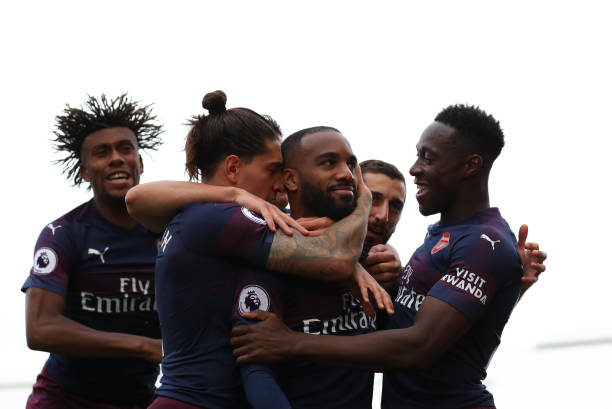According to reports this week, the FA is considering cutting the number of overseas players allowed in each Premier League squad after Brexit, but how would this affect Arsenal?
The proposed new cut to overseas players would mean a minimum of 13 players in each 25-man squad would have to be homegrown. The current minimum is eight players.
2017/18
This wouldn’t have significantly affected Arsenal last season. If we exclude players who were sold in January, as they wouldn’t appear in the squad for the second half of the season, the Gunners had 14 non-homegrown players who played in the Premier League.
Here’s the full list, along with their number of appearances:
- Granit Xhaka – 38
- Petr Cech – 34
- Alexandre Lacazette – 32
- Nacho Monreal – 28
- Sead Kolasinac – 27
- Shkodran Mustafi – 27
- Mesut Özil – 26
- Laurent Koscielny – 25
- Mohamed Elneny – 13
- Pierre-Emerick Aubameyang – 13
- Henrikh Mkhitaryan – 11
- Per Mertesacker – 6
- David Ospina – 5
- Konstantinos Mavropanos – 3
Konstantinos Mavropanos was 19, making him eligible for Arsenal’s u21 squad, where you can have as many overseas players as you like. Therefore the Gunners were only one player over the proposed new limit of 12. David Ospina’s 5 appearances would have to be cut, but that’s all.
By comparison, Chelsea would’ve had to cut 30 appearances between four different players, and Manchester United would’ve had to drop four players making 21 appearances between them.
2018/19
Now, let’s have a look at how the squad is shaping up this season:
- Pierre-Emerick Aubameyang – 12
- Shkodran Mustafi – 12
- Alexandre Lacazette – 12
- Granit Xhaka – 12
- Lucas Torreira – 12
- Mesut Özil – 10
- Henrikh Mkhitaryan – 9
- Matteo Guendouzi – 9
- Petr Cech – 7
- Nacho Monreal – 7
- Bernd Leno – 6
- Sokratis Papastathopoulos – 6
- Stephan Lichtsteiner – 3
- Sead Kolasinac – 2
Once again, there are 14 players on the list, and we can remove one of them (Guendouzi) for being under 21. Just like last season, Arsenal would be one player above the limit of 12.
However, this doesn’t take into account some other non-homegrown members of the squad who are likely to feature later in the campaign.
Mohamed Elneny hasn’t made a Premier League appearance just yet, nor has the injured Laurent Koscielny. The same goes for Konstantinos Mavropanos, who is still u21 for now, but won’t be for long, and won’t count as homegrown when he does have to go into the first-team squad.
Suddenly the new rules start to look a lot more restrictive.
It’s not all bad (but it mostly is)
The one advantage of the FA’s proposal is that they would agree to getting rid of the current restrictive work-permit rules for non-EU players. That would mean the likes of Kelechi Nwakali and Takuma Asano would get a chance at Arsenal, rather than going out on loan after loan in the hope that next year they’ll get a permit.
Nwakali is still under 21, so he wouldn’t even have to use up a non-homegrown spot in the first-team squad – yet.
Still, overall this would still be an overwhelmingly limiting move, which would undoubtedly weaken the strength of each individual squad and by extension the league itself.
The benefits to homegrown players won’t be as great, because the league won’t be as strong as it used to be, and English teams will suffer in Europe against those that can sign players from wherever they want.
We’ll give more young English players chances, but those that do play will be taking part in lower quality matches and likely missing out on the biggest occasions.
Four English players started for Liverpool in the Champions League final last season, but would Jurgen Klopp’s side even have made it there without all the overseas players in their squad? If they’d ignored a Firmino, Mane or Salah because they couldn’t fit another non-homegrown player in, who knows?
Let’s see if the FA pushes the proposals through all the same.

